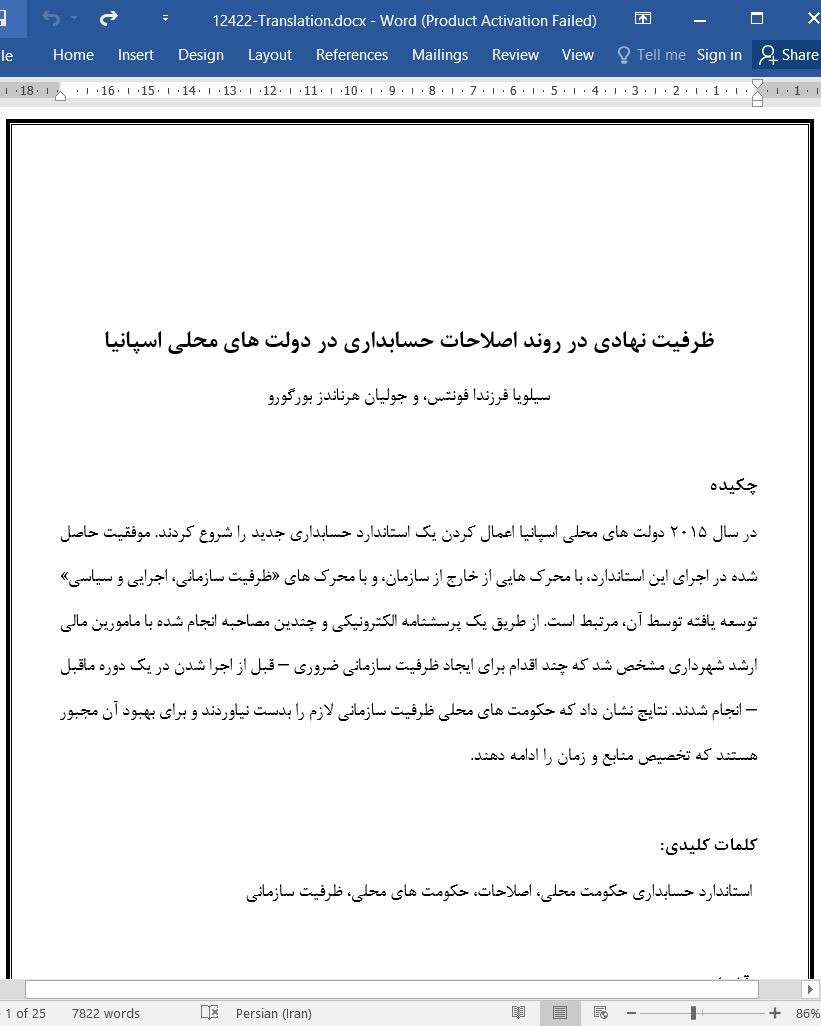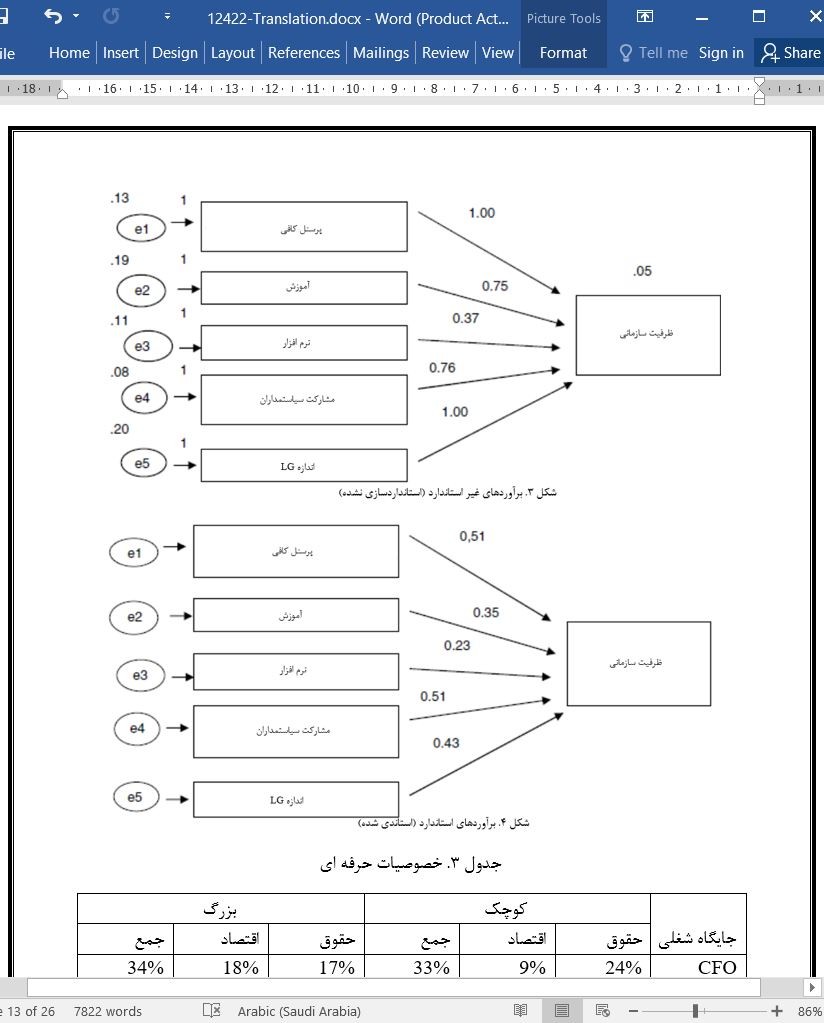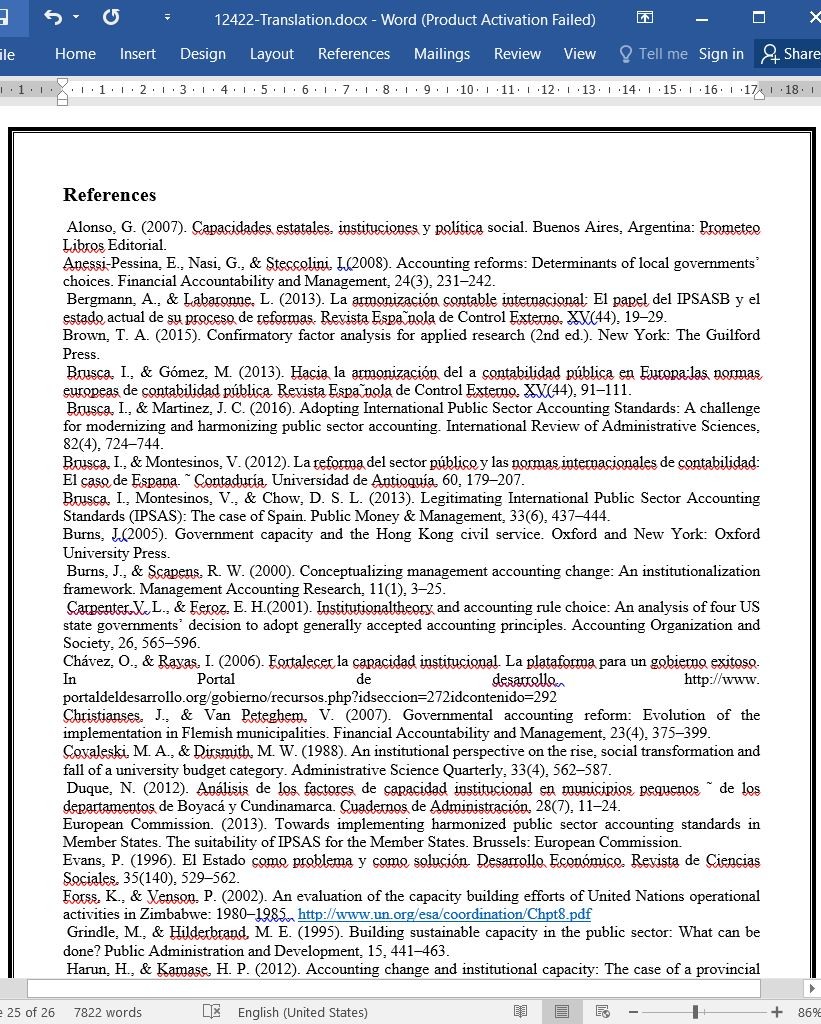
دانلود مقاله ظرفیت نهادی در روند اصلاحات حسابداری در دولت های محلی اسپانیا
چکیده
در سال 2015 دولت های محلی اسپانیا اعمال کردن یک استاندارد حسابداری جدید را شروع کردند. موفقیت حاصل شده در اجرای این استاندارد، با محرک هایی از خارج از سازمان، و با محرک های «ظرفیت سازمانی، اجرایی و سیاسی» توسعه یافته توسط آن، مرتبط است. از طریق یک پرسشنامه الکترونیکی و چندین مصاحبه انجام شده با مامورین مالی ارشد شهرداری مشخص شد که چند اقدام برای ایجاد ظرفیت سازمانی ضروری – قبل از اجرا شدن در یک دوره ماقبل – انجام شدند. نتایج نشان داد که حکومت های محلی ظرفیت سازمانی لازم را بدست نیاوردند و برای بهبود آن مجبور هستند که تخصیص منابع و زمان را ادامه دهند.
مقدمه
اتخاذ یک استاندارد حسابداری عمومی جدید در سال 2010 (که از این به بعد آنرا PAS می نامیم) و برای کمیته های بخش عمومی دولت اسپانیا قابل اجرا بود، سبب افزایش اصلاح اساسی مدل حسابداری شد که بازتابی از تغییر قانونی بود که قبلاً در سال 2007 در بخش خصوصی اسپانیا رخ داده بود. مثالی از این قبیل، مدیریت و اطلاعات مالی است که مدیران را قادر می سازد تا تصمیمات مناسبی اتخاذ کنند و نتیجه مدیریت تیم های دولتی را به شهروندان اطلاع دهند. با اینکار نقش سهامدار به شهروندان داده میشود (کریستیانسس و وان پیتیگم). این اصلاحات به معنای گامی بسوی فرآیند نوین سازی مدیریت (اجرایی) عمومی اسپانیا بود که در سال 1981 شروع شد.
اجرای موفقیت آمیز یک PAS برای تحقق اهداف دیگر مرتبط با مدیریت عمومی جدید، اهمیت زیادی دارد. این اجرا ارتباط مستقیمی با موارد روبرو دارد: محرک های خارجی که بر سازمان تأثیر می گذارند، و ظرفیت سازمانی توسعه یافته توسط این محرک ها. این نیز به نوبه خود از طریق ظرفیت سازمان برای «تفسیر، درک و اعمال اصول و الزامات مشمول دراصلاحات، آموزش کارکنان، و دسترس پذیری ابزارهای فنی» تعیین می شود (کووالسکی و دیر اسمیت 1988؛ هارون و کاماس 2012؛ پاول و دی ماگیو 1991؛ پوزولیو رانوکسی 2013). آنسی-پسینا، ناسی، و استکولینی (2008) نشان داده اند که در مورد حکومت های محلی ایتالیا، عوامل عقلانی مانند اندازه حکومت محلی (که از این به بعد آنرا LG می نامیم)، وابستگی به بازار پول، و میزان پیچیدگی ابزارهای سنجش اتخاذ شده، اعمال یک استاندارد حسابداری جدید مبتنی بر اقلام تعهدی را تعیین نمی کنند. با اینحال آنها تأیید می کنند که عوامل سازمانی مانند ادراک های مدیرهای ارشد مالی و موقعیت جغرافیایی، شرط هایی را برای این کاربرد تعیین می کنند. بعلاوه این با اهمیتی مطابق است که افراد مسئول برای اجرای قانون قائل هستند. آنها همچنین توضیح میدهند که تحلیل تأثیر متغیرهای دیگری مانند شایستگی ها، مهارت ها، ادراک ها و مقاومت مدیریان و سیاستمداران در مقابل تغییر، کار مفیدی خواهد بود.
ملاحظات نهایی
فرآیند اصلاحات سیستم حسابداری مقامات (حکومت های) محلی بخش عمومی اسپانیا مورد تجزیه و تحلیل قرار گرفته است. اتخاذ استاندارد حسابداری جدید مستلزم منابع (سرمایه گذاری بر روی سیستم های فناوری اطلاعات و آموزش) و پشتیبانی سیاسی است (PwC, 2014). این عوامل، ظرفیت سازمانی را از هر دو جنبه اجرایی و سیاسی تعیین می کنند (اوسلاک 2004).
هدف مطالعه حاضر این است که تعیین کند آیا LG ها موفق شده اند ظرفیت سازمانی مورد نیاز برای اجرای موفقیت آمیز AI جدید را قبل از اول ژانویه 2015 توسعه دهند یا نه.
یافته های این مطالعه می تواند مبنایی را برای کشورهای دیگر (بطور عمومی) و برای کشورهای اتحادیه اروپایی (بصورت اختصاصی) برای روند اصلاحات حسابداری بخش عمومی تشکیل دهد تا بتوانند بر اثرات منفی غلبه کنند و عوامل مثبت شناسایی شدن در این مطالعه را بهبود دهند. بعلاوه این مطالعه تأثیر متغیرهای تحلیل شده در مقالات در راستای موفقیت ظرفیت سازمانی در LG های اسپانیا را تأیید کرده است. با اینحال مدل پیشنهادی – که آزمایش و تأیید شد – میتواند مانند منبعی برای تحقیقات بیشتر عمل کند.
Abstract
In 2015, Spanish local governments began to apply a new accounting standard. The success achieved in its implementation is related with stimuli from outside the organization and with the institutional capacity – administrative and political – developed by it. Through an electronic questionnaire and several interviews carried out with municipal chief financial officers it has been shown that few actions to build the necessary institutional capacity were undertaken in the period prior to its implementation. The results show that the LGs did not attain the necessary institutional capacity and will have to continue allocating resources and time to improve it.
Introduction
The adopting in 2010 of a new public accounting standard (hereafter, PAS), applicable to Spanish state public sector bodies, gave rise to a substantial modifying of the accounting model which reflected the legislative change that had already taken place in the Spanish private sector in 2007. An example of this is the supplying of management and financial information which enables administrators to make appropriate decisions and informs citizens of the result of the government teams’ management. This grants citizens the role of being one stakeholder more (Christianses & Van Peteghem, 2007). This reform means a step forward in the modernization process of the Spanish public administration which began in 1981.
A successful PAS implementation is crucial to attain other aims linked to new public management. This implementation is directly related to both the external stimuli which are brought to bear on the organization and the institutional capacity developed by it. This, in turn, is determined by the organization’s capacity to interpret, understand and apply the principles and requirements included in the reform, the staff training and the availability of technical means (Covaleski & Dirsmith, 1988; Harun & Kamase, 2012; Powell & DiMaggio, 1991; Pozzoli & Ranucci, 2013). Anessi-Pessina, Nasi, and Steccolini (2008) show that in the case of Italian local governments, rational factors such as the size of the Local Government (hereafter, LG), dependence on the money market and the degree of complexity of the measures undertaken do not determine the applying of a new accruals-based accounting standard. However, they confirm that institutional factors, such as the CFOs’ perceptions and the geographical location, do condition this application. This is, moreover, consistent with the importance that those in charge give to enforcing the law. Likewise, they point out that it would be interesting to analyze the impact of other variables, such as competencies, skills, perceptions and managers’ and politicians’ resistance to change.
Final considerations
The reform process ofthe accounting system ofthe Spanish public sector’s local authorities has been analyzed. The adoption of new accounting standard require resources -investments in information technology systems and training- and political support (PwC, 2014). These factors determine the institutional capacity in both its administrative and political aspects (Oslak, 2004).
This study’s aim is to determine if the LGs have managed to develop the institutional capacity required to successfully implement the new AI before January 1st, 2015.
The findings may provide a basis for other countries, in general, and for the countries of the European Union particular, in the process of public sector accounting reform, to attempt to override the negative effects and enhance the positive factors identified in the study. Moreover, this work has verified the influence of the variables analyzed in the literature in the achievement of institutional capacity in Spanish LGs. The model proposed, having been tested and validated, may serve as a reference for further research.
چکیده
مقدمه
تعریف ظرفیت سازمانی
اصلاحات فرآیند حسابداری عمومی اسپانیا
سوالات تحقیق و روش شناسی
تحلیل نتایج
منابع انسانی
آموزش
منابع فنی (نرم افزار)
ملاحظات نهایی
منابع
ABSTRACT
Introduction
Defining institutional capacity
Spanish public accounting process reform
Research questions and methodology
Analysis of the results
Human resources
Training
Technical resources (software)
Final considerations
References
- اصل مقاله انگلیسی با فرمت ورد (word) با قابلیت ویرایش
- ترجمه فارسی مقاله با فرمت ورد (word) با قابلیت ویرایش، بدون آرم سایت ای ترجمه
- ترجمه فارسی مقاله با فرمت pdf، بدون آرم سایت ای ترجمه



